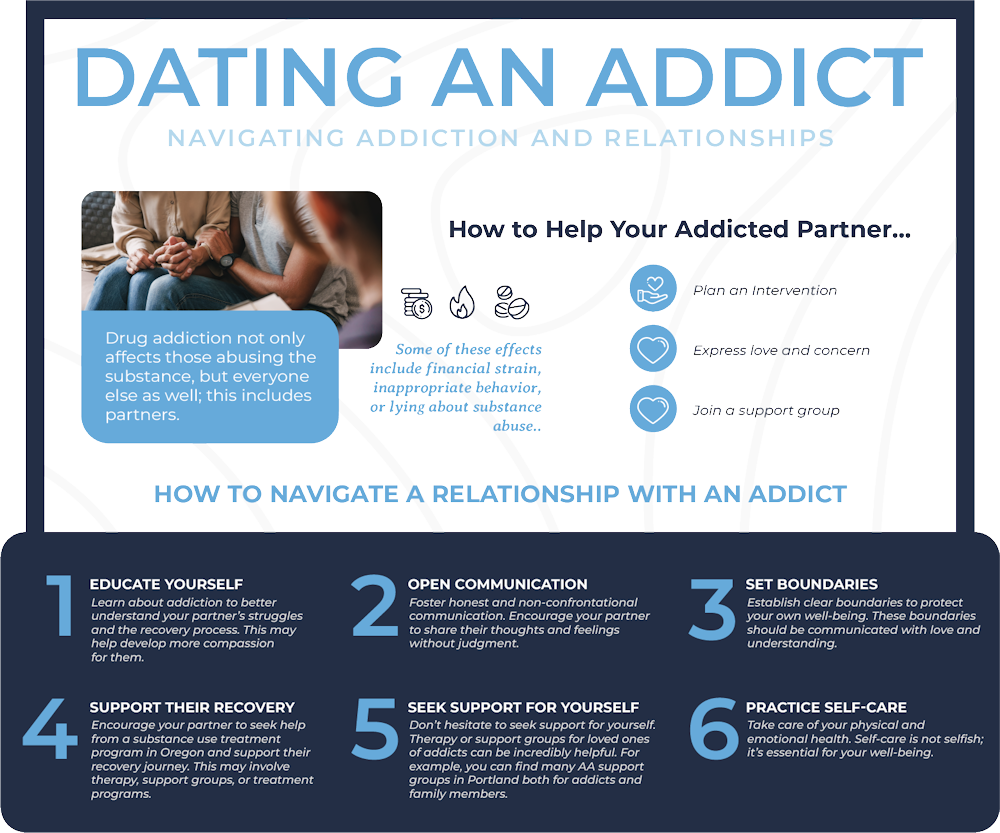Love is a beautiful and complex journey, often filled with joy, companionship, and shared dreams. However, it can also involve challenges and obstacles that test the strength of the bond between two people. One such obstacle that many couples face is addiction. Dating someone with an addiction can be a rollercoaster of emotions, but it’s essential to remember that recovery is possible, and with the right approach, love can prevail.
In this blog, we’ll explore what it’s like to date someone with an addiction, what addiction looks like, and how it can affect a relationship. We’ll also discuss how to navigate such a relationship and offer insights on how to provide support to your partner on their journey to recovery.
Our team at Crestview Recovery has many addiction and rehab resources available for those affected by substance use. If you or someone you know is struggling with addiction, contact us today!
Understanding Addiction
Addiction is a complex, chronic disease characterized by compulsive substance use or behavior despite harmful consequences. It can manifest in various forms, such as alcoholism, drug addiction, gambling addiction, or even addiction to work or technology. Recognizing addiction often involves observing the following signs:
- Loss of Control: An addict may find it challenging to limit or control their substance use or behavior, even when they want to stop.
- Cravings: Intense urges or cravings for the substance or activity in question are common.
- Neglect of Responsibilities: Addiction often leads to neglecting work, family, and social obligations.
- Physical and Psychological Changes: The individual may experience physical symptoms (withdrawal) and emotional changes when unable to engage in their addictive behavior. Weight loss or weight gain is also a common sign of addiction.
- Denial: Denial is a common defense mechanism where the addict may refuse to acknowledge the severity of their problem.
How Does Addiction Affect a Relationship?

Dating someone with an addiction can be emotionally draining and challenging for both partners. Behaviors caused by an addictive habit can cause problems, such as trust issues, financial strain, and codependency. Often someone with a substance addiction attempts to hide their drug or alcohol use. This secrecy breaks down the bond of trust in a relationship. As a person who’s dating someone addicted to drugs, it can be emotionally taxing. Feelings of anger, frustration, and sadness toward the addicted partner can erode the relationship and create lasting issues.
Abusing alcohol or drugs is also an expensive habit. For partners with shared finances or working toward financial goals together, addiction can be devastating. A partner may also get themselves into debt to afford their drug habit and lean on their partner for financial support in other areas, such as housing. Not only does this create financial difficulty, but addiction can also cause partners to be unhealthily codependent. In some cases, a partner may focus entirely on the needs of an addict to get them help or enable them. Someone who is addicted to substances may also become codependent and rely heavily on their partner.
Inversely, addiction can be very isolating. Either partner in the relationship may experience feelings of being alone due to the drug or alcohol habit. The family therapy services in Portland at Crestview Recovery can help repair damage to relationships such as this. Therapy for both partners is also useful for teaching how to navigate a relationship post-treatment and provides resources to understand addiction better.
How to Navigate the Relationship with an Addict

Navigating a relationship with someone who has an addiction requires patience, understanding, and a commitment to both your partner and yourself. Here are some tips to help you navigate this challenging journey:
Educate Yourself: Learn about addiction to better understand your partner’s struggles and the recovery process. This may help develop more compassion for a partner’s struggle with substance use.
Open Communication: Foster honest and non-confrontational communication. Encourage your partner to share their thoughts and feelings without judgment.
Set Boundaries: Establish clear boundaries to protect your own well-being. These boundaries should be communicated with love and understanding. Often setting a boundary also can prevent a partner from enabling addiction behavior.
Support Their Recovery: Encourage your partner to seek help from a substance use treatment program in Oregon and support their recovery journey. This may involve therapy, support groups, or treatment programs.
Seek Support: Don’t hesitate to seek support for yourself. Therapy or support groups for loved ones of addicts can be incredibly helpful. For example, you can find many AA support groups in Portland both for addicts and family members.
Practice Self-Care: Take care of your physical and emotional health. Self-care is not selfish; it’s essential for your well-being.
Tips for Helping Your Partner Who’s Addicted
Supporting a partner who’s struggling with addiction can be challenging, but your support can be instrumental in their recovery. Here are some ways to help your partner without enabling their addiction:
Express Love and Concern: Let your partner know that you care about their well-being and that you’re there to support them.
Encourage Professional Help: Encourage them to seek professional treatment. Be prepared to help them find resources and accompany them to appointments.
Avoid Enabling: Refrain from enabling their addiction by providing money or covering up for their mistakes.
Celebrate Milestones: Celebrate their small victories and milestones in recovery. Positive reinforcement can be motivating.
Be Patient: Recovery is a process filled with ups and downs. Be patient and understanding during setbacks.
Addiction Treatment in Portland Oregon

Learn about the addiction treatment programs we offer at Crestview Recovery to help you and your partner choose the best treatment for your situation. You can also discuss treatment options with our admissions team. We offer a full continuum of care to ensure your partner can achieve long-lasting recovery.
Residential Rehab
Residential rehab, also known as inpatient addiction treatment, involves a comprehensive and immersive approach to addiction recovery. When participating in this type of program, your partner will live at the treatment facility 24/7 for a specified period, typically ranging from 28 to 90 days or longer. Our residential drug and alcohol rehab program provides a highly structured environment where individuals can focus solely on their recovery. This involves psychotherapy, education, and holistic activities to overcome addiction.
Inpatient programs are recommended for individuals with severe addiction issues, those who require a controlled environment, or those who have attempted outpatient treatment without success.
Intensive Outpatient Program
An intensive outpatient program (IOP) is a structured treatment program that allows individuals to live at home while receiving intensive addiction treatment during the day or evening. It typically involves group therapy, individual counseling, and educational sessions. IOP offers more flexibility compared to residential rehab. This program is most suitable for those who don’t require 24/7 supervision but still need intensive support.
Partial Hospitalization Program
Our PHP in Oregon offers a high level of care, just shy of inpatient treatment. Participants receive therapy and medical support during the day at a treatment center but return home in the evenings. This program is designed to address both addiction and any co-occurring mental health issues. It’s often recommended for individuals who have completed residential rehab or need intensive treatment for dual-diagnosis conditions.
Dual Diagnosis Treatment
Dual diagnosis programs are tailored for individuals struggling with both addiction and co-occurring mental health disorders, such as depression, anxiety, or bipolar disorder. These programs provide integrated care, addressing both conditions simultaneously to improve overall well-being.
It’s essential for individuals dealing with addiction and underlying mental health issues to get dual diagnosis treatment, as treating one without the other can lead to relapse.
Outpatient Program
Outpatient programs offer flexible treatment options, allowing individuals to live at home and maintain daily responsibilities. Sessions, including group therapy and individual counseling, are scheduled at various frequencies, such as weekly or bi-weekly, depending on the individual’s needs.
Outpatient rehab programs in Oregon are suitable for those with milder addiction issues or as a step-down program after more intensive treatment.
Gender-Specific Care
Gender-specific addiction treatment programs tailor their approach to the unique needs and experiences of either men or women. Our women’s rehab program and men’s rehab program in Portland, Oregon, create a safe and comfortable environment for individuals to discuss gender-specific issues and challenges that may be contributing to their addiction.
These programs can be suitable for anyone, but they may be especially beneficial for individuals who prefer or require a gender-specific support system. Knowing that we offer highly individualized options for treatment can help your partner feel more comfortable about receiving treatment.
Get Help at Crestview Recovery
Dating someone with an addiction can be challenging, but it’s important to remember that recovery is possible. Love, support, and open communication are key to navigating this journey together. By understanding addiction, setting boundaries, and offering help without enabling, you can create a supportive environment that promotes your partner’s recovery while preserving the integrity of your relationship. Remember, you are not alone—there are resources and communities ready to support you and your partner on this path to healing.
Call our team at Crestview Recovery today! We will provide you with treatment options for your partner and also give you resources to navigate the recovery process with them.
































